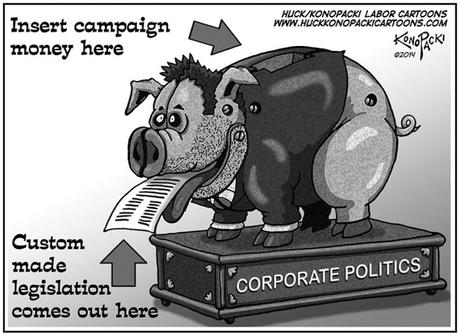 (Cartoon image is by Mike Konopacki at huckkonopackicartoons.com.)
(Cartoon image is by Mike Konopacki at huckkonopackicartoons.com.)The combination of a misguided Supreme Court decision on political donations and the Republican "trickle-down" economic policies have been disastrous for this country's economy and political system. It has resulted in a shrinking middle class, and most income going to the richest Americans -- creating a wealth/income gap that is larger than any since before the Great Depression. The rich and the politicians had their grip on our political system, and are using that to further enrich themselves at the expense of most other Americans.
We must restructure the power in this country so we can have an economy that is favorable to all Americans -- not just the rich and corporations. This won't happen as long as the Republicans remain in power. They have made it clear that their constituency is the rich and corporations.
Former Labor Secretary Robert Reich has written an excellent article on this. I urge you to go to his website and read the whole article. Here is part of that article:
The term “free market” suggests outcomes are objectively fair and that any “intervention” in the free market is somehow “unnatural.” But in reality, markets cannot exist without people constructing them. Markets depend on rules, and rules come out of legislatures, executive agencies, and courts. The biggest political change over the last four decades is the overwhelming dominance of big money in politics – influencing what those rules are to be. Now, go back to the first three decades after World War II – a period that coupled the greatest economic expansion the world has ever seen with the creation of the largest middle class the world has ever witnessed. The great economic thinker John Kenneth Galbraith asked at the time: Why is capitalism working so well for so many? His answer was as surprising as it was obvious: American capitalism contained hidden pools of what he called “countervailing power” that offset the power of large corporations, Wall Street, and the wealthy: labor unions, state and local banks, farm cooperatives, and small retail chains, for example. All of these sources of countervailing power had been fostered by the New Deal. They balanced the American economic system. But since the late 1970s, these sources of countervailing power have been decimated, leading to an unbalanced system and producing widening economic inequality and stagnating wages. The result has become a vicious cycle in which big money – emanating from big corporations, Wall Street, and the wealthy – determine the rules of the economic game, and those rules generate more money at the top. Consider, for example, the ever-expanding tax cuts or loopholes for large corporations, the financial sector, and the wealthy. Contrast them with increases in payroll taxes for average workers. Or look at the bank and corporate bailouts but little or no help for homeowners caught in the downdraft of the Great Recession. Finally, look at the increasing barriers to labor unions, such as the proliferation of so-called “right-to-work” laws and the simultaneous erosion of antitrust and the emergence of large concentrations of corporate power. The public knows the game is rigged, which is why almost all the political energy is now anti-establishment. This is a big reason why Trump won the 2016 election. Authoritarian populists through history have used anger and directed it at racial and ethnic minorities and foreigners. It’s also a big reason why the only alternative to authoritarian populism is progressive populism – countervailing the moneyed interests with a democracy that reorganizes the market to benefit the many rather than a small group at the top. How do we build a new countervailing power and move toward a new progressive economics? The choice isn’t between a free market and government. The question is who has the power to organize the market, and for whom. Stagnant wages, job insecurity, widening inequality, and mounting wealth at the top are the result of political choices. The system is rigged and must be un-rigged. Conventional economics posits that the most important goals are efficiency and economic growth. But policies can be “efficient” by making the rich even wealthier as long as no one else is worse off – and that won’t remedy what’s happened. Economic growth is meaningless if the gains from growth keep going to the top and nothing trickles down. Stop assuming that all that’s needed is better education and job training. Sure, Americans need access to better schools and skills, but the basic problem isn’t simply a “skills gap.” It’s a market that’s organized to push more income and wealth toward the top, rather than distribute it broadly. Stop aiming to “redistribute” from richer to poorer after the market has distributed income. Instead, change the organization of the market so that a fair pre-distribution occurs inside it. Stop thinking that the goal is only to create more jobs. America’s real jobs crisis is a scarcity of good jobs. The American economy cannot generate widespread prosperity without a large and growing middle class whose spending fuels the economy. Don’t let the moneyed interests divide and conquer along racial and gender lines. Racism and sexism are very real issues within our economic system, and they are often exploited to keep us from realizing the power we can have when we stand together. All are disempowered by the moneyed interests, and all have a stake in rebuilding countervailing power.

